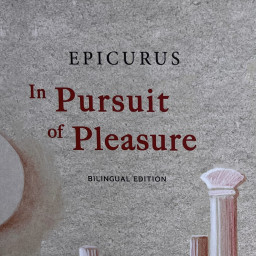Welcome to Episode 282 of Lucretius Today. This is a podcast dedicated to the poet Lucretius, who wrote "On The Nature of Things," the most complete presentation of Epicurean philosophy left to us from the ancient world.
Each week we walk you through the Epicurean texts, and we discuss how Epicurean philosophy can apply to you today. If you find the Epicurean worldview attractive, we invite you to join us in the study of Epicurus at EpicureanFriends.com, where we discuss this and all of our podcast episodes.
This week we continue our series covering Cicero's "Tusculan Disputations" from an Epicurean viewpoint. This series addresses five of the greatest questions in human life (Death, Pain, Grief/Fear, Joy/Desire, and Virtue) with Cicero speaking for the majority and Epicurus the main opponent:
Today we continue in Part 2 - "Is Pain An Evil?," picking up with Section XI, where Cicero attacks Epicurus for saying that pain is the greatest evil.
--------------------------
Our general discussion guide for Tusculun Disputations is here: https://epicureanfriends.github.io/tusculundisput…lish/section:12
And a side-by-side version with comments is here:
EpicureanFriends SideBySide Commentary on TD
Cassius May 25, 2025 at 11:18 AM
I started to post this in Rolf's "Confusion - The Feelings Are Only Two" thread, because it gets at how Epicurus can at times be speaking in broad philosophical terms. But it comes from this week's podcast, so I will put it here. This is a passage we cover in the upcoming Lucretius Today Podcast from Book 1 of Tusculan Disputations:
XII.¶
But why are we angry with the poets? we may find some philosophers, those masters of virtue, who have taught that pain was the greatest of evils. But you, young man, when you said but just now that it appeared so to you, upon being asked by me what appeared greater than infamy, gave up that opinion at a word. Suppose I ask Epicurus the same question. He will answer, that a trifling degree of pain is a greater evil than the greatest infamy; for that there is no evil in infamy itself, unless attended with pain. What pain then attends Epicurus, when he says this very thing, that pain is the greatest evil; and yet nothing can be a greater disgrace to a philosopher than to talk thus.
I would suggest that this is another example of Epicurus speaking philosophically in ways that contradict our current modern presumptions. We today think of "evil" as supernaturally black-hearted or the like.
But while there is no "evil" in Epicurean philosophy in the sense of supernatural personified devils or sin, Epicurus does use a word that we translate as "evil" to describe pain. How do we reconcile that?
I'd say we reconcile it by saying that Epicurus is telling us to disregard the concept of sinning against gods or supernatural "evil," but instead we can make legitimate use of the word "evil" to describe something that we very much don't want to experience and which we avoid when it makes sense to avoid it.
In unwinding Cicero's statement, to me what Cicero is doing is switching the context to distort Epicurus' intent.
Epicurus could easily be saying, and apparently did say, that:
1. Pain is always "evil," because it is undesirable in itself.
2. But "infamy" is not always "evil." - An Epicurean could say that he doesn't care at all what the crowd thinks, if he thinks what he is doing is the correct thing to do, but he would care if the crowd takes action to inflict pain on him because of it.
Therefore speaking philosophically, even a trifling amount of pain, if experienced for no reason, is always "evil," while the worst "infamy" cannot be with certainty judged to be evil unless it results in actual harm to the person involved.
I'll leave the rest for the podcast discussion, but I illustrated this by referring to Cicero himself, and to Cassius Longinus.
in certain circles Cicero was held up to "infamy" for his execution of the Cataline conspirators. Likewise, Cassius was held up to "infamy" for the assassination of Julius Caesar.
But at the time they took those actions, there was no necessity that those actions would result in infamy or bad results to them at all. Cicero believed that his actions regarding Cataline were among his most heroic, and would send him down in history as the savior of the Roman Republic. If Cassius and Brutus had won the battle of Philippi, then they too would likely have been judged to have saved Rome from julius Caesar's dictatorship.
So you can support the idea that even trifling amounts of "pain" are worse than any amount of "infamy" by speaking strictly: "Pain of and for itself" is always undesirable, but no amount of "infamy" can reliably be judged as always undesirable without referring to consequences.
I don't know whether Epicurus said something like this explicitly, or whether Cicero invented the argument like he misrepresented Epicurus as saying that being in the bull of Phalaris is "sweet." But either way, we can read between the lines and unwind the points being made by Epicurus, and see that Epicurus was regularly making philosophical points ("the feelings are two, pleasure and pain, so that absence of pain is the same as pleasure.") that are easy to misrepresent if you take them out of context.
The wise one will also pay just enough attention to their reputation as to avoid being looked down upon. (DL 10.120)
Hicks: He will pay just so much regard to his reputation as not to be looked down upon.
Yonge: He will show a regard for a fair reputation to such an extent as to avoid being despised;
Original text: εὐδοξίας ἐπὶ τοσοῦτον προνοήσεσθαι,
εὐδοξίας good repute
τοσοῦτον so far as
Provide for good repute for as far as...
ἐφ᾽ ὅσον μὴ καταφρονήσεσθαι:
καταφρονέω look down upon, think slightly of
So, the translations are accurate.
Episode 282 of the Lucretius Today Podcast is now available. Today we continue Part Two of Cicero's treatment of the nature of evil in Tusculan Disputations, and our episode is entitled: "Is A Trifling Pain A Greater Evil Than The Worst Infamy?"
Great episode! Accepting the belief that evil exists as a disembodied force leaves one under the control of those who decide how to wield it.
Exploring alternate paths in Roman history -- and how they would have redefined who the “bad guys” were -- is a good way to illustrate the point. Thank you!
Marcus Aurelius, Meditations, 9.41:
Epíkouros says that "in my illness, my conversations were not about the feelings of my little body, nor was I chatting about such things to those who visited, but, while studying nature, I continued with the prior topics, even while in that very state, studying how the mind (although participating in such movements occurring within my little bit of flesh) remains untroubled, while preserving its own good. Nor did I surrender power to the doctors to act important as if they were accomplishing something – instead, my lifestyle was being led well and correctly."
Epicurus could easily be saying, and apparently did say, that:
1. Pain is always "evil," because it is undesirable in itself.
2. But "infamy" is not always "evil." - An Epicurean could say that he doesn't care at all what the crowd thinks, if he thinks what he is doing is the correct thing to do, but he would care if the crowd takes action to inflict pain on him because of it.
For Sunday June1st discussion.
For an Epicurean (“wise man”) who is trying to live prudently, honestly, justly and pleasantly; wouldn’t an unkind, untrue, or manufactured accusation that caused public infamy, also bring mental pain to the wise man? Thus there can be mental pain from untrue infamy, right?
Thus there can be mental pain from untrue infamy, right?
That may well be the point.
There can be pain from infamy, but necessarily so? On the other hand, pain is always painful.
You're right this is good food for thought for the discussion.
It's likely that what we have here is Epicurus making a very legitimate point about something, and Cicero distorting it by taking it out of context, so our job is to unwind the problem.
After Sunday’s Zoom on the topic, I listened to Episode 282 again. I wonder if Cicero’s elevation of infamy over pain as an evil might, from an Epicurean point of view, be an affirmation of pain being the ultimate object to be avoided.
It looks like, though we can’t know what was truly on his mind, that Cicero’s point of reference was his own internal “pain” or mental anxiety from doing an infamous act. Perhaps he could be forgiven for failing to recognize that by avoiding infamy, he was actually avoiding mental or physical pain resulting from an infamous action. Whether he was looking at his own present perception of how he might react to an infamy, or reflecting upon an act in the past that brought him infamy, it was still avoiding the “pain” of anxiety.
Unread Threads
-
- Title
- Replies
- Last Reply
-
-

-
The Religion of Nature - as supported by Lucretius' De Rerum Natura 1
- Kalosyni
June 12, 2025 at 12:03 PM - General Discussion
- Kalosyni
June 12, 2025 at 1:16 PM
-
- Replies
- 1
- Views
- 65
1
-
-
-

-
'Philosophos' web site - philosophical connections 2
- TauPhi
June 11, 2025 at 5:02 PM - General Discussion
- TauPhi
June 12, 2025 at 9:34 AM
-
- Replies
- 2
- Views
- 128
2
-
-
-

-
Who are capable of figuring the problem out 5
- Patrikios
June 5, 2025 at 4:25 PM - General Discussion
- Patrikios
June 6, 2025 at 6:54 PM
-
- Replies
- 5
- Views
- 363
5
-
-
-

-
What fears does modern science remove, as Epicurean physics did in antiquity? 31
- sanantoniogarden
June 2, 2025 at 3:35 PM - General Discussion
- sanantoniogarden
June 6, 2025 at 2:05 PM
-
- Replies
- 31
- Views
- 1k
31
-
-
-

-
Porphyry - Letter to Marcella -"Vain Is the Word of the Philosopher..." 17
- Cassius
June 12, 2023 at 11:34 AM - Usener Collection
- Cassius
June 3, 2025 at 11:17 PM
-
- Replies
- 17
- Views
- 5.9k
17
-

